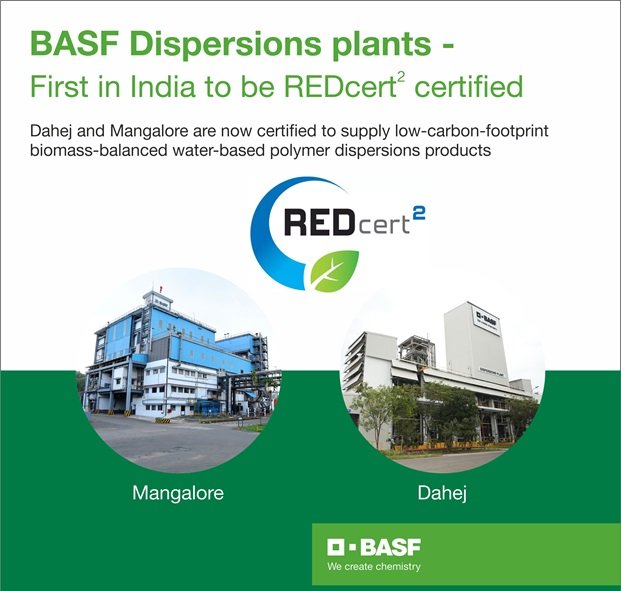BASF India receives REDcert2 certification to supply low-carbon-footprint dispersions
Basf’s dispersions plants in Dahej and Mangalore are the first plants in India capable of producing REDcert2-certified biomass-balanced acrylic dispersions.
BASF India Limited announced that its two dispersions plants in Dahej and Mangalore, India, have each received REDcert2 certification. These plants are the first in India to achieve the REDcert2 standard, an independent third-party audit process, marking a significant milestone in BASF’s commitment to sustainability and environmental stewardship. This certification enables BASF to supply certified low-carbon-footprint dispersions through the biomass balance (BMB) approach that perform identically to fossil-based dispersions.
Andreas Fechtenkoetter, Senior Vice President, Dispersions Asia Pacific, BASF said, “Achieving REDcert2 certifications for our dispersion plants in India underscores our commitment to driving sustainability and innovation as an industry leader. We have successful customer cases for our REDcert2-certified products in the Asia Pacific region. Customers in countries such as China, Japan, and other ASEAN markets have embraced our biomass balanced solution to reduce their carbon footprint along the value chain. Paint manufacturers and consumer goods producers have adopted our biomass balanced product portfolios and are leveraging its benefits to achieve their sustainability objectives.”
With India’s continued prioritization of CO2 reduction, BASF is seeing a growing demand for sustainable products in the country. The Indian government has committed to achieve net zero emissions by 2070. “With our REDcert2-certified dispersions plants in operation, we are well-positioned to supply biomass-balanced dispersions to our customers in the country and support their sustainability plans,” said Milind Joshi, Business Director, Dispersions (South Asia), BASF. “By adopting our low-carbon-footprint solutions, customers are not only differentiating themselves from competitors but also contributing to the larger goal of combating climate change.”
The two certified dispersion plants in India bring the number of BASF dispersion plants in the Asia Pacific region that have received REDcert2 certification to five. This accomplishment has further strengthened BASF’s ability to meet the growing demand for low-carbon-footprint solutions across various industries.
In BASF’s biomass balance approach, renewable raw materials are used as feedstock in the very first steps of chemical production. The proportion of renewable raw materials utilized is then allocated to specific sales products using a mass balance method certified by REDcert². The REDcert² certification system confirms that for the biomass balanced product, BASF has replaced relevant quantities of fossil-based resources with renewable feedstock.
Basf’s dispersions plants in Dahej and Mangalore

